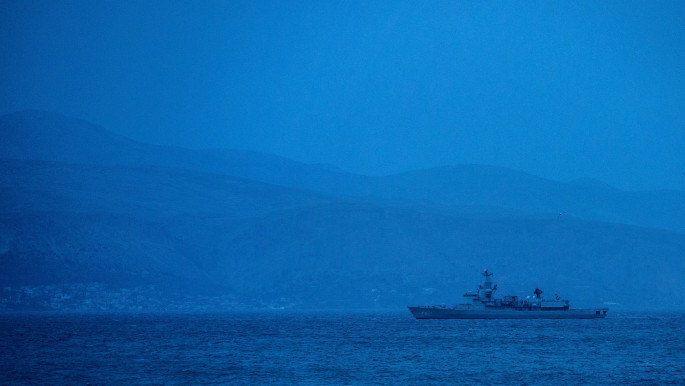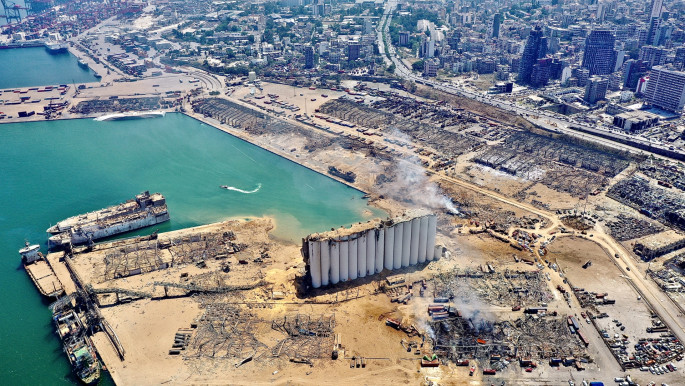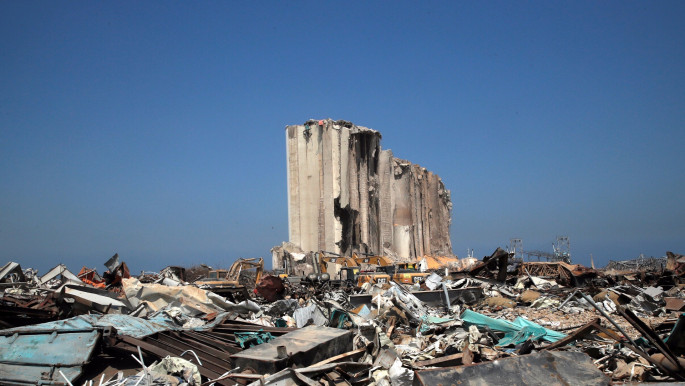Lebanon-Israel negotiations: Another US-brokered normalisation deal or 'technical' maritime border talks?
But to work on the seabed of the Levantine Basin to extract hydrocarbon resources, Lebanon will first be required to sit down for unprecedented talks with Israel.
Although still in a formal state of war, Israel and Lebanon will start negotiations over their maritime border dispute on Wednesday, 14 October - the first talks between the two sides in 30 years.
US Secretary of State Mike Pompeo has described the talks as "historic", following years of US shuttle diplomacy. Representatives of the two countries will meet at the UNIFIL headquarters in Naqoura, south Lebanon, in the presence of US and UN officials.
Both delegations are expected to sit in the same hall, but will likely direct their talks through a mediator.
Maritime border
The dispute dates back to 2007, when Cyprus and Lebanon signed an agreement over an exclusive economic zone to delimit their maritime border. The bilateral accord, however, left open the possibility to amend a maritime zone between Lebanon and Israel in light of future delimitations with other neighbouring states.
 |
Although still in a formal state of war, Israel and Lebanon have begun negotiations over their maritime border dispute |  |
The agreement was ratified by Cyprus in 2009 but not by Lebanon. When Israel signed an exclusive economic zone agreement with Cyprus in 2010, it took the coordinates subject to the amendment within the Cyprus-Lebanon agreement as the northern boundary of the Israel-Cyprus agreement. As a result, a maritime border overlap emerged, creating a dispute between Israel and Lebanon.
Israel deposited those coordinates to the United Nations in July 2011, but Lebanon protested the agreement between Cyprus and Israel because the use of the coordinates by Israel would have absorbed part of the exclusive economic zone of Lebanon, which it said constituted a flagrant attack on Lebanon's sovereign rights over that zone.
 |
|
| Read more: Aegean angst: Greece and Turkey's dangerous Eastern Mediterranean game |
The crisis over the 860-square-kilometer disputed area worsened in late 2017 when Lebanon signed an exploration and production agreement in the offshore zone - within Lebanese jurisdiction - with the French company Total (in partnership with the Italian company ENI and Russia's second-largest natural gas producer Novatek) for energy Blocks 4 and 9.
Although the hydrocarbon system found during the exploration of Block 4 was declared unviable commercially, the Lebanese government was hoping to find useful gas resources in Block 9. Seismic surveys showed promising results, but only drilling could confirm the presence of relevant commercial quantities of gas resources.
However, the promising energy block planned to be drilled by Lebanon was located within the disputed area with Israel, which declared it within its own maritime waters. Tensions rose on 23 June, 2020, when Israel announced its third offshore bidding round for oil and natural gas exploration of Block 72 (formerly known as Alon D), a maritime area located on the border with Lebanon.
 |
Lebanon's ambitious offshore plans to become a gas-producing country are rooted in the hope of resuscitating a collapsing economy |  |
Israel's Block 72 and Lebanon's Block 9 are contiguous and partially located in the disputed area between the two countries. In the meantime, the international consortium led by Total postponed its exploration and drills of Block 9 due to the Covid-19 outbreak, but Lebanon is pressing the company not to delay drills further, which were scheduled to start by 2020 and end by May 2021.
Currently, Lebanon doesn't use natural gas, and imports oil and crude products from abroad. This lack of access to gas supplies and the limited options to import gas from neighbouring countries hasn't, however, pushed Lebanon to invest in the sector. Moreover, cheap market prices for oil during the 1980s and 1990s reduced any incentive to switch from the use of fuel oil in the power sector.
But Lebanon's ambitious offshore plans to become a gas-producing country are rooted in the hope of resuscitating a collapsing economy. The country is bankrupt, with Lebanon's annual inflation rate surging to 120.03 percent in August of 2020, and its public debt skyrocketing.
 |
|
| Read more: The geopolitical race to rebuild Beirut's port |
The Lebanese Pound lost around 80 percent of its value over the past year. The Covid-19 outbreak, political instability, and the devastating explosion in Beirut have dramatically worsened living conditions for Lebanese civilians.
The discovery of small commercial gas resources could provide Lebanon with an opportunity to feed primarily into its domestic market and develop small-scale exports into neighbouring countries, according to a policy paper published by the Lebanese Center for Policy Studies.
However, building such infrastructure would require time and investment, and the lucrative revenue that the discovery of oil and gas would provide wouldn't be sufficient to respond to the economic crisis, which requires immediate intervention.
 |
Officials have insisted that negotiations are purely technical and don't involve any soft political normalisation with Israel |  |
Moreover, long term plans to build an export market can only be set in motion once Lebanon can comprehensively profit from commercially viable hydrocarbon reservoirs. So far, the exploration of the Lebanese seabed in disputed waters has only served to create an unprecedented political scenario with Israel.
Normalisation?
Negotiations between Lebanon and Israel over the maritime dispute follow a series of US-backed agreements to normalise relations between Israel, the United Arab Emirates (UAE) and Bahrain, seen as a flurry of American diplomatic efforts to boost Donald Trump's re-election campaign. The talks also take place as the US recently ramped up sanctions on companies and individuals with ties to Hezbollah.
 |
|
| Read more: Is time running out for Macron's credibility in Lebanon? |
Officials, however, have insisted that negotiations are purely technical and don't involve any soft political normalisation with Israel. The Israeli Minister of Energy, Yuval Steinitz, tweeted that the talks are "an attempt to resolve a technical-economic dispute that has been delaying the development of natural resources at sea for ten years for the benefit of the peoples of the region."
Hezbollah said that demarcating Lebanon's disputed maritime border does not signify "reconciliation" or "normalisation", while Lebanese President Michel Aoun has also insisted that the talks are not a sign of peace-making with its long-time enemy.
But even though any resolution of the technical economic dispute is likely a long way off, the talks could have an impact on political relations between the two countries.
On one hand, Lebanon wants to secure its rights to drill in the disputed area in the hope of finding a way out of its economic crisis. However unlikely in the short term, to achieve this result there is a possibility it could come to some terms of agreement with Israel.
Israel, meanwhile, wants to expand its explorations and drills to achieve energy independence. Tel Aviv also wants a positive result to relieve its domestic political crisis, amid nationwide protests against Israeli Prime Minister Benjamin Netanyahu and a poorly managed Covid-19 crisis.
Amid Israel and Lebanon's domestic objectives, the Trump administration also seeks to further bolster its purported peace-making interventions in the Middle East following landmark Gulf normalisation deals, by reuniting two countries at war.
Dario Sabaghi is a freelance journalist interested in human rights.
Follow him on Twitter: @DarioSabaghi





 Follow the Middle East's top stories in English at The New Arab on Google News
Follow the Middle East's top stories in English at The New Arab on Google News


